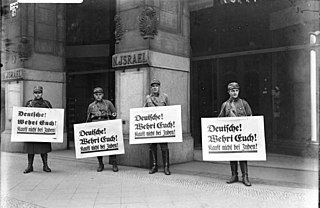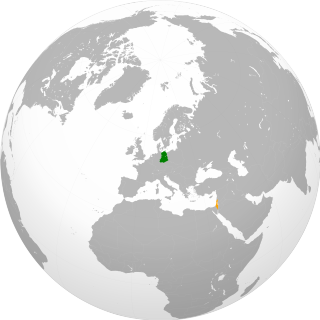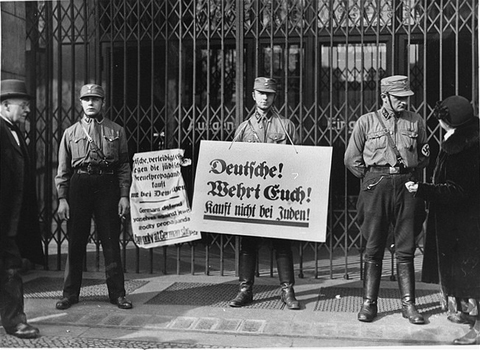
Paul Joseph Goebbels was a German Nazi politician and Reich Minister of Propaganda of Nazi Germany from 1933 to 1945. He was one of Adolf Hitler's closest and most devoted associates, and was known for his skills in public speaking and his deeply virulent antisemitism, which was evident in his publicly voiced views. He advocated progressively harsher discrimination, including the extermination of the Jews in the Holocaust.

Kristallnacht or the Night of Broken Glass, also called the November Pogrom(s), was a pogrom against Jews carried out by SA paramilitary forces and civilians throughout Nazi Germany on 9–10 November 1938. The German authorities looked on without intervening. The name Kristallnacht comes from the shards of broken glass that littered the streets after the windows of Jewish-owned stores, buildings and synagogues were smashed.

The World Jewish Congress (WJC) was founded in Geneva, Switzerland, in August 1936 as an international federation of Jewish communities and organizations. According to its mission statement, the World Jewish Congress' main purpose is to act as "the diplomatic arm of the Jewish people." Membership in the WJC is open to all representative Jewish groups or communities, irrespective of the social, political or economic ideology of the community's host country. The World Jewish Congress headquarters are in New York City, US, and the organization maintains international offices in Brussels, Belgium; Jerusalem, Israel; Paris, France; Moscow, Russia; Buenos Aires, Argentina; and Geneva, Switzerland. The WJC has special consultative status with the United Nations Economic and Social Council.

The German American Bund, or German American Federation, was a German-American pro-Nazi organization established in 1936 to succeed Friends of New Germany (FoNG), the new name being chosen to emphasize the group's American credentials after press criticism that the organization was unpatriotic. The Bund was to consist only of American citizens of German descent. Its main goal was to promote a favorable view of Nazi Germany.

The Reparations Agreement between Israel and the Federal Republic of Germany was signed on September 10, 1952, and entered in force on March 27, 1953. According to the Agreement, West Germany was to pay Israel for the costs of "resettling so great a number of uprooted and destitute Jewish refugees" after the war, and to compensate individual Jews, via the Conference on Jewish Material Claims Against Germany, for losses in Jewish livelihood and property resulting from Nazi persecution.
The Rosenstrasse protest was a collective street protest on Rosenstraße in Berlin during February and March 1943. This demonstration was initiated and sustained by the non-Jewish wives and relatives of Jewish men who had been arrested and targeted for deportation, based on the racial policy of Nazi Germany. The protests continued until the men being held were released. The Rosenstrasse protest is significant in its singularity as the only mass public demonstration by Germans in the Third Reich against the deportation of Jews.

Michael Cardinal Ritter von Faulhaber was a senior Catholic prelate and Archbishop of Munich for 35 years, from 1917 to his death in 1952. Cardinal von Faulhaber rejected the Weimar Republic as rooted in treason and opposed democratic government in general, favoring a Catholic monarchy. Faulhaber publicly recognized the Nazi government as legitimate, required Catholic clergy to remain loyal to the Nazi government, and maintained bridges between fascism and the Church. He ordained Joseph Ratzinger as a priest in 1951, and was the last surviving Cardinal appointed by Pope Benedict XV.

Haim Arlosoroff was a Zionist leader of the Yishuv during the British Mandate for Palestine, prior to the establishment of Israel, and head of the Political Department of the Jewish Agency. In 1933, Arlosoroff was assassinated while walking on the beach in Tel Aviv.

The American Jewish Congress (AJCongress) is an association of American Jews organized to defend Jewish interests at home and abroad through public policy advocacy, using diplomacy, legislation, and the courts.

The propaganda used by the German Nazi Party in the years leading up to and during Adolf Hitler's leadership of Germany (1933–1945) was a crucial instrument for acquiring and maintaining power, and for the implementation of Nazi policies. The pervasive use of propaganda by the Nazis is largely responsible for the word "propaganda" itself acquiring its present negative connotations.

The Nuremberg Laws were antisemitic and racist laws in Nazi Germany. They were enacted by the Reichstag on 15 September 1935, at a special meeting convened during the annual Nuremberg Rally of the Nazi Party (NSDAP). The two laws were the Law for the Protection of German Blood and German Honour, which forbade marriages and extramarital intercourse between Jews and Germans and the employment of German females under 45 in Jewish households, and the Reich Citizenship Law, which declared that only those of German or related blood were eligible to be Reich citizens. The remainder were classed as state subjects without any citizenship rights. A supplementary decree outlining the definition of who was Jewish was passed on 14 November, and the Reich Citizenship Law officially came into force on that date. The laws were expanded on 26 November 1935 to include Romani people and Black people. This supplementary decree defined Romanis as "enemies of the race-based state", the same category as Jews.
Max Naumann was the founder of Verband nationaldeutscher Juden, which called for the elimination of Jewish ethnic identity through Jewish assimilation. The league was outlawed by the Nazis on 18 November 1935.

The Holocaust, also known as the Shoah, was the World War II genocide of the European Jews. Between 1941 and 1945, across German-occupied Europe, Nazi Germany and its collaborators systematically murdered some six million Jews, around two-thirds of Europe's Jewish population. The murders were carried out in pogroms and mass shootings; by a policy of extermination through work in concentration camps; and in gas chambers and gas vans in German extermination camps, chiefly Auschwitz, Bełżec, Chełmno, Majdanek, Sobibór, and Treblinka in occupied Poland.

The Nazi boycott of Jewish businesses in Germany began on April 1, 1933, and was claimed to be a defensive reaction to the Jewish boycott of German goods, which had been initiated but quickly abandoned in March 1933. It was largely unsuccessful, as the German population continued to use Jewish businesses, but revealed the intent of the Nazis to undermine the viability of Jews in Germany.

The Haavara Agreement was an agreement between Nazi Germany and Zionist German Jews signed on 25 August 1933. The agreement was finalized after three months of talks by the Zionist Federation of Germany, the Anglo-Palestine Bank and the economic authorities of Nazi Germany. It was a major factor in making possible the migration of approximately 60,000 German Jews to Palestine in 1933–1939.
The Association of German National Jews was a German Jewish organization during the Weimar Republic and the early years of Nazi Germany that eventually came out in support of Hitler.

The Transfer Agreement: The Dramatic Story of the Pact Between the Third Reich and Jewish Palestine is a book written by author Edwin Black, documenting the transfer agreement between Zionist organizations and Nazi Germany to transfer a number of Jews and their assets to Palestine. Shortly after Samuel Untermyer's return to the U.S. from Germany in 1933, articles appeared on the front page of newspapers in London and New York declaring that "Judea declares war on Germany". This resulted in an effective boycott of German goods in many countries, affecting German exports significantly. The agreement was partly inspired by this boycott which appeared to threaten the Reich. Controversial as it may be seen in hindsight, it marked one of the few rescues of Jews and their assets in the years leading up to the Holocaust.

The State of Israel and the German Democratic Republic never had official diplomatic relations throughout the latter's nearly forty years of existence. Even after the fall of the Berlin Wall no ambassadors were exchanged. The official policy of East Germany emphasized the necessity to differentiate between Jews and the Israeli state. This approach, stemming originally from the theories of Marx and Lenin on nationalism, class struggle, and the "irreconcilable struggle between socialism and imperialism" also served to counter accusations of antisemitism. In this context, a specific relationship or responsibility of the German people to the Jewish state was denied. Relations can be divided into 3 periods: positive neutrality (1948–1956), confrontation (1956–1985) and movement towards rapprochement (1986–1990).
Antisemitic boycotts, also known as anti-Jewish boycotts are organized boycotts directed against Jewish people to exclude them economical, political or cultural life. Antisemitic boycotts are often regarded as a manifestation of popular antisemitism.
The Nazi party used cartoons and caricatures as a main part of their propaganda regime and as an effective way to send out their message and spread their opinions across Nazi Germany. The use of caricatures was a popular method within the party when pursuing their campaign against America, in particular President Franklin D. Roosevelt.















